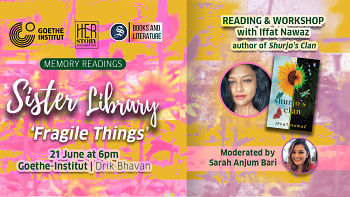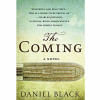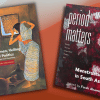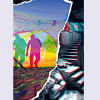Tucked between moving trains and elegiac dead-ends

Some among us might have wondered what it feels like to hold a lit bomb between our palms. One that will go off inevitably yet its spark, heat, force, weight, and pulsating nature are so fascinating that we are unable to put it down or look away, all the while knowing at the end of the wick we too will be destroyed—a chosen death, a voluntary annihilation.
I felt similarly as I held Anees Salim's The Blind Lady's Descendants between my palms. From the very first page I knew we were in for a beautiful doom, one that would leave intricate scars. Set in 1970s/80s/early 90s Kerala, in a small town adorned by cliffs next to the Arabian sea, the novel revolves around a family with dark and open secrets, middle-class burdens, carrying the dogmas of religion and its overlooked holes. One could sum it up as a social commentary on the small town Muslim identity in India but then we would miss out on its poetries, subtleties, and melancholies that feel too appealing not to dip into.
Let's forget the fact that this book had received the Sahitya Academy award in 2018 and the Raymond Crossword Book award for best fiction in 2014, and that we were told by our parents to read good books which the world had vouched for; let's instead turn to the parts that will make you laugh out loud, the seething sarcasm that holds the power to define certain unanalysed situations of your own life while drawing anew the stereotypical faces of lust, loneliness, lamentations along with their sad manifestations. Told in the first person by the protagonist Amar Hamsa, a 26-year-old who is writing his memoir, Anees Salim does not miss a beat when it comes to burying a hidden treasure in an insidious place to pull it out as a full grown and actualised simile years or pages later.
If you want to catch a delightful long sigh of a few short, familiar, and devastating lives laced with beauty, tragedy, humour, and gorgeous imageries which will both haunt you and draw you to new places (or previously overlooked ones), this is the book to pick up next.
The family dynamics and the characters which are developed with empathy and astute craftsmanship, can resemble people you have known. The faces, the foreshadowed deaths, the ever-moving trains, the marriages and miscarriages—all were relatable to me as a Bangladeshi, because we too, in a small town or not, have seen or been persons who grew up understanding innuendoes of shame and guilt, pride and dead-ends, and our lives written out for us before we got to straighten out the wrinkled creases to find another route, to escape the grip of fate and its thick stagnancy.
If you want to catch a delightful long sigh of a few short, familiar, and devastating lives laced with beauty, tragedy, humour, and gorgeous imageries which will both haunt you and draw you to new places (or previously overlooked ones), this is the book to pick up next. Be touched, explode, and before you break apart by the force of Anees Salim's storytelling, smile and cry some—this book will hold you as you do.
The Blind Lady's Descendants is available at Bookworm Dhaka, Bangladesh.
Iffat Nawaz is a Bangladeshi-American writer based in Pondicherry, India. Her first novel Shurjo's Clan was published by Penguin India (Vintage) in 2022, and was shortlisted for the Best First Book Award by Tata Lit Live/Mumbai Literature Festival in 2023.

 For all latest news, follow The Daily Star's Google News channel.
For all latest news, follow The Daily Star's Google News channel. 








Comments